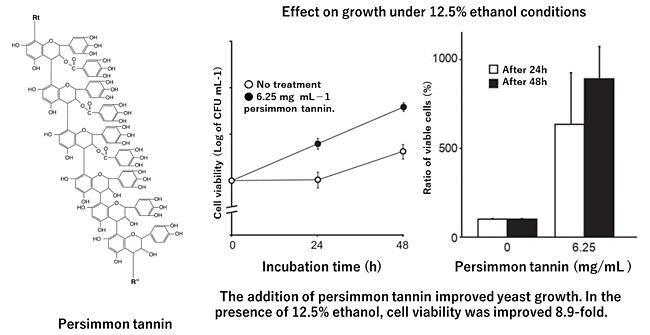A research group led by Graduate Student Ilhamzah and Professor Ken-ichi Fujita of the Molecular Microbiology Laboratory at the Graduate School of Science, and Professor Akira Ogita of the Research Center for Urban Health and Sports at Osaka Metropolitan University, has announced their research results demonstrating that tannins extracted from the Japanese persimmon, known for their antioxidant effects, improve yeast growth in the presence of ethanol. Persimmon tannins are expected to be used as a protective agent to enhance yeast tolerance to ethanol stress. The findings were published in the March 6 issue of the Journal of the Science of Food and Agriculture.

Provided by Osaka Metropolitan University
Yeast produces ethanol through fermentation and is used in a variety of industries, including bioethanol production and the fermentation of alcoholic beverages. However, stress from ethanol produced by the yeast cells themselves limits growth, reducing yields, and this issue needs to be addressed. In the present study, the researchers added persimmon tannins to a medium containing ethanol, cultured yeast in the medium, and found that the number of cells increased by 8.9-fold compared to that without the addition of persimmon tannins. Yeast growth was investigated by the colony counting method, and growth was shown to be inhibited in the presence of 12.5% ethanol. In the experiment, persimmon tannins at a concentration of 6.25 mg/milliliter were added under this condition. Although persimmon tannins reduced ethanol-induced oxidative stress, such as the formation of reactive oxygen species and acceleration of lipid peroxidation, persimmon tannins could hardly ameliorate ethanol-induced cell membrane damage. Molecular characterization of persimmon tannins revealed that they are not taken up into yeast cells as they are hydrophilic, ultra-high-molecular-weight molecules, and that they improve cell growth by reducing oxidative stress occurring on the cell surface. Moving forward, the group plans to examine whether the yield of the final product can be actually increased with yeast used in industry and investigate whether other plant-derived ingredients have similar activity.
Fujita said, "In this study, tannins, the main components of persimmons, were found to improve yeast growth by reducing oxidative stress. Recently, cells can be stained with fluorescent probe molecules to analyze the mechanism of action. As persimmon tannins are ultra-high-molecular-weight molecules that emit intense fluorescence, it was difficult to separate them from yeast cells and capture the fluorescence emitted by the fluorescent probe molecules. In the future, we expect that persimmon tannins will be used in the fermentation production of bioethanol and supplements."
Journal Information
Publication: Journal of the Science of Food and Agriculture
Title: Persimmon tannin promotes the growth of Saccharomyces cerevisiae under ethanol stress
DOI: 10.1002/jsfa.13439
This article has been translated by JST with permission from The Science News Ltd. (https://sci-news.co.jp/). Unauthorized reproduction of the article and photographs is prohibited.




